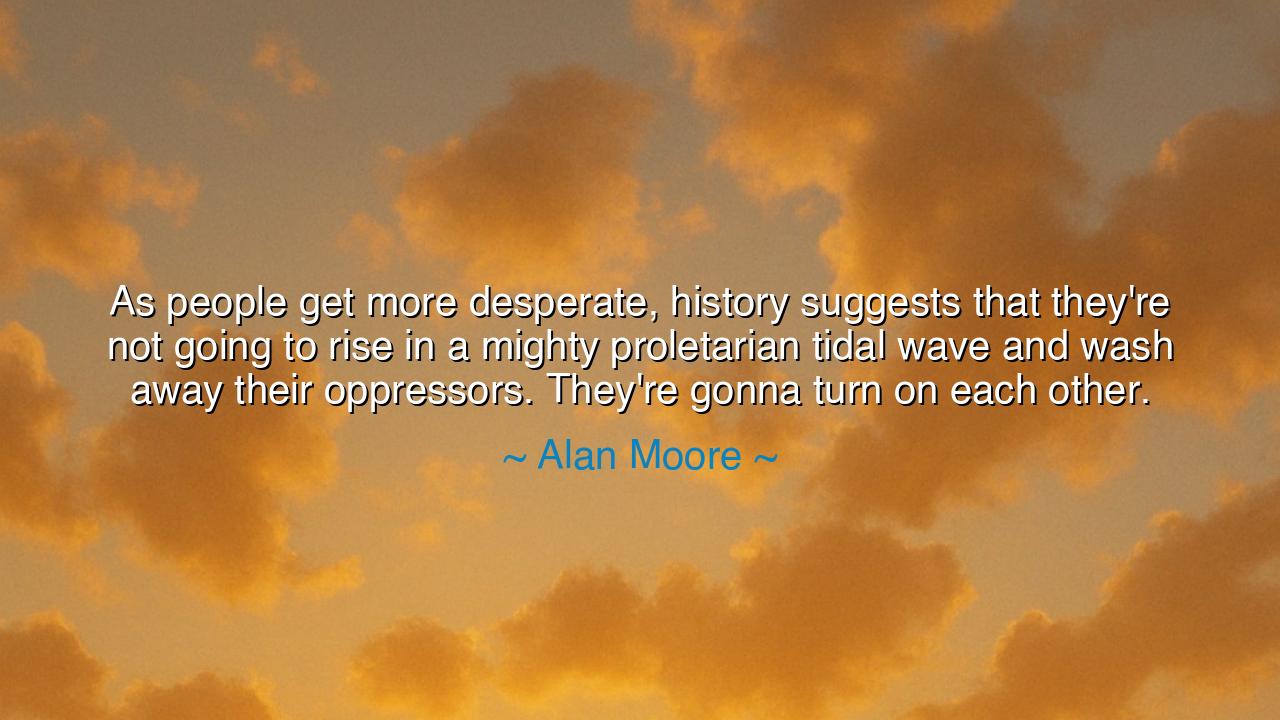
As people get more desperate, history suggests that they're not
As people get more desperate, history suggests that they're not going to rise in a mighty proletarian tidal wave and wash away their oppressors. They're gonna turn on each other.






“As people get more desperate, history suggests that they're not going to rise in a mighty proletarian tidal wave and wash away their oppressors. They're gonna turn on each other.” Thus spoke Alan Moore, the prophet of ink and imagination, whose stories pierce through the veils of society to reveal the trembling truths beneath. In these words, he warns us not only of politics, but of the frailty of the human spirit under pressure — a lesson written not merely in books, but in the long, blood-soaked scroll of history itself. For when hunger gnaws at the belly and fear shadows the mind, men forget their kinship and see enemies in those who stand beside them. Moore’s lament is not a condemnation, but a mirror: he shows us what we become when we abandon unity for survival, compassion for rage, and understanding for blame.
His wisdom arises from the study of civilizations that have risen and fallen, of revolutions that have burned bright and then devoured themselves. When Moore speaks of desperation, he speaks of that moment when the structures that sustain life begin to crumble — when the poor grow poorer, the hungry grow hopeless, and the rulers deaf to their cries. It is in such moments that myths promise redemption: the idea of the “mighty proletarian tidal wave”, the uprising of the downtrodden to overthrow their oppressors. Yet Moore, ever the realist cloaked in myth, reminds us that such unity is rare, for oppression breeds not only suffering but division. Those who are most wounded are often pitted against one another by the cunning of power, and so they fight their neighbors instead of their masters.
This pattern is ancient, as old as empire itself. Consider the fall of Rome, when famine, plague, and corruption gnawed at the heart of the once-mighty republic. The citizens, weary and fearful, did not rise as one to cleanse their society of greed and decay. They turned inward — brother against brother, neighbor against neighbor — while the powerful tightened their grip and the city rotted from within. Or look to the French Revolution, that storm of fire and justice which began with the cry for liberty but soon drowned itself in blood. Once the people had torn down their kings, they turned upon each other — patriots accusing patriots, radicals devouring radicals, the guillotine claiming those it once crowned as heroes. Desperation is a flame; it can light the world or consume it entirely.
Moore’s words also whisper to our own age, for though the tools have changed, the hearts of men remain much the same. In times of crisis — of economic ruin, fear, and uncertainty — the masses do not always unite against injustice. Too often, they seek smaller enemies: immigrants, neighbors, those who look or think differently. The old powers understand this well; they sow distrust and reap control. Thus, the true oppressors remain untouched, hidden behind walls of wealth, while the people battle among themselves in the ruins. This is the tragedy Moore foretells — the self-destruction of the many, orchestrated by the few.
Yet his message is not one of despair, but of awakening. To see this truth is to be armed against it. If history shows us that desperation breeds division, then wisdom teaches us that empathy breeds strength. The antidote to despair is not blind revolution, but conscious unity — the understanding that the suffering of one is bound to the suffering of all. Only when the people recognize their shared humanity can they resist the ancient spell that turns them against each other. The wave Moore describes need not be one of blood; it can be one of solidarity, of minds awakening together to reject the illusions that divide them.
Think, for example, of Nelson Mandela and the struggle against apartheid in South Africa. There, the oppressed did not merely rise in violence, though the temptation was great. Instead, they forged a revolution of reconciliation — a fight guided not by hatred, but by the vision of a just society. Mandela understood what Moore warns: that anger without direction destroys the righteous cause it seeks to serve. Only by mastering that anger, by transforming it into purpose and understanding, can true liberation be achieved. The strongest revolution is not born of rage alone, but of compassion tempered by truth.
So, my child of the future, heed this lesson: when the world darkens and fear begins to whisper, do not turn upon your brother. When despair tempts you to seek blame, remember that division is the oldest weapon of tyranny. Look deeper. See the true architects of suffering, and unite not in hatred, but in resolve. For while desperation may fracture the weak, solidarity will forge the strong. The pulse of history beats in cycles — collapse, division, rebirth — but the wise may yet break that cycle by choosing connection over chaos. And perhaps then, when the tide rises again, it will not be a wave that destroys, but one that cleanses and carries all forward together.






AAdministratorAdministrator
Welcome, honored guests. Please leave a comment, we will respond soon